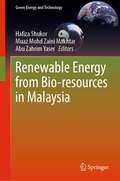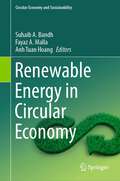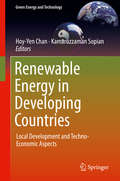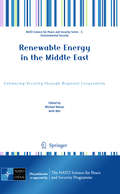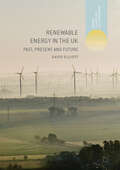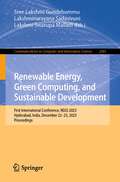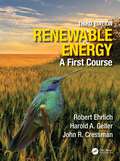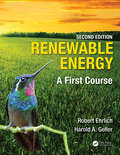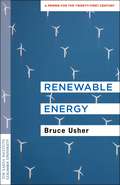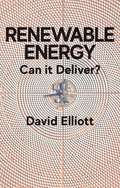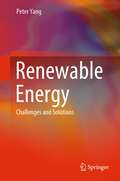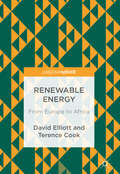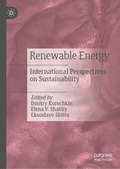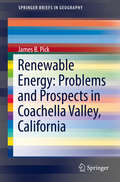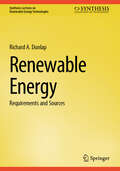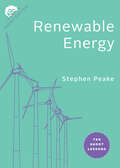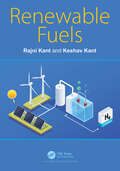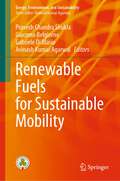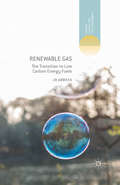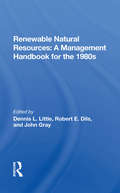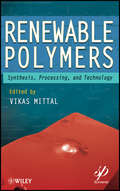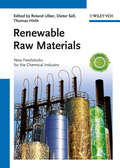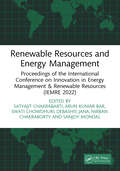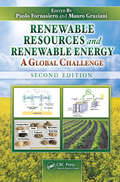- Table View
- List View
Renewable Energy from Bio-resources in Malaysia (Green Energy and Technology)
by Abu Zahrim Yaser Hafiza Shukor Muaz Mohd Zaini MakhtarThis book highlights current efforts and research in Malaysia on conversion of bio-resources to renewable energy of biofuel as an alternative way of producing energy from fossil-based fuels. The book starts with the renewable energy developments and policies in Malaysia and discusses the main renewable resources available. It addresses the use of more environmentally friendly technologies which can lead to the reduction of pollution and thus sustaining the ecology for treatment of bio-resources. The book also presents new initiatives in bioenergy production with theories, applications, and challenges of biological processes of biofuel production such as bioethanol, biobutanol, biogas, microbial fuel cell (MFC), and biodiesel. It discusses the potential of renewable energy resources to meet the energy needs without damaging/affecting the environment.
Renewable Energy in Circular Economy (Circular Economy and Sustainability)
by Suhaib A. Bandh Anh Tuan Hoang Fayaz A. MallaThe book provides a comprehensive overview of the technologies and processes involved in renewable energy generation, with a specific focus on their role in improving the circular economy. It offers all the necessary information and tools to help readers select the most sustainable renewable energy solution for different conditions.Exploring real-life examples, the book delves into the practical applications of the circular economy in the renewable energy sector. It takes a multi-faceted approach, examining the circular economy from various perspectives and incorporating methods such as lifecycle assessment, sustainability assessment, multi-criteria decision-making, and multi-objective optimization modes. Furthermore, the book explores the concept of blockchain, hybrid renewable energy models, technologies, and implementation. It also investigates the critical factors and key enablers that influence sustainable development in this field. By doing so, it not only facilitates the transition to a circular economy but also highlights the shift in recent research, trends, and attitudes towards a more scientifically grounded approach.The primary objective of this book is to compile research specifically focused on the circular economy in renewable energy. By providing researchers and policymakers in the energy sector with the necessary scientific methodology and metrics, it enables the development of strategies for a sustainable transition. This book serves as a valuable resource for students, researchers, and practitioners seeking to deepen their understanding of energy planning and the current and future trends of biofuel as an alternative fuel.
Renewable Energy in Developing Countries: Local Development And Techno-economic (Green Energy and Technology)
by Hoy-Yen Chan Kamaruzzaman SopianThis book discusses aspects of policy and techno-economic analysis of renewable energy in developing countries. Renewable energy technologies have been one of the most important strategies in addressing sustainable energy development and climate change. The roles of renewable energy in developing countries are vital, which include the accessibility of modern energy services in rural areas, climate change mitigation, energy security, green job creation and eventually improvement of quality of life. Part I of this book focuses on policy and strategy, while Part II focuses on technology development and feasibility. Chapters are contributed by leading experts from the ASEAN Center of Energy, government agencies, industries, and universities from five developing countries, including Malaysia, Indonesia, Vietnam, Brunei Darussalam and Bangladesh.
Renewable Energy in the Middle East
by Michael Mason Amit MorEnergy insecurity is not normally associated with the Middle East. However, away from the oil-rich Persian Gulf, the countries of the eastern Mediterranean are particularly vulnerable. Their fossil fuel endowments are low, while their fractious relationships with each other have long fostered wider political insecurities. Focusing on the Jordan Basin (Israel, the Palestinian Territories, Lebanon and Jordan), this timely volume addresses the prospects for the adoption of renewable energy in the oil-poor Middle East. Featuring regional energy experts, it offers an invaluable survey. After outlining the regional security context, this book first reviews renewable energy policy and practices in the Jordan Basin. It then considers options for greening energy use, including promising pilot projects in North Africa. The initiatives discussed encompass renewable energy finance, energy-efficient rural communities, and solar and wind energy. There is significant potential for an increase in the uptake of renewable energy technologies in the eastern Mediterranean. This window of opportunity has been created by high oil prices, energy infrastructure investment opportunities, and the UN climate change regime. In conclusion, the book considers the institutional conditions for collaborative decision-making on renewable energy. Such cooperation would deliver substantial security and human development benefits to the region, and indeed the world.
Renewable Energy in the UK: Past, Present and Future (Energy, Climate and the Environment)
by David ElliottThis book offers a detailed account of how renewable energy has moved from the margins to the mainstream in the UK, and of the battles that have been fought to achieve this, trawling through the often troubled history of government involvement. The book examines how renewables became what now seem likely to be the dominant energy sources of the future. Renewable energy technologies, using solar and wind power and other natural energy sources, are now supplying around 30% of UK electricity and appear set to continue expanding to supply around 50% within the next decade. Although the emphasis of the book is on the UK, developments there are compared with those in other countries to provide an overall assessment of the relevance of the UK experience. Chapters explore why the UK still lags behind many other countries in deploying renewables, in part, it is argued, due to its continued reliance on nuclear power. The book ends with a discussion on what sort of changes may be expected over the coming years. The author does not assume a single answer, but invites readers to consider the possibilities.
Renewable Energy, Green Computing, and Sustainable Development: First International Conference, REGS 2023, Hyderabad, India, December 22-23, 2023, Proceedings (Communications in Computer and Information Science #2081)
by Sree Lakshmi Gundebommu Lakshminarayana Sadasivuni Lakshmi Swarupa MalladiThis book constitutes the refereed post proceedings of the First International Conference on Renewable Energy, Green Computing, and Sustainable Development, REGS 2023, held in Hyderabad, India, during December 22-23, 2023. The 15 full papers included in this book were carefully reviewed and selected from 133 submissions. They were organized in topical sections as follows: Expert Systems and Artificial Intelligence; Modelling and Methods of Green Computing; Power Electronics and Renewable Energy Technologies and Communications and Signal Processing.
Renewable Energy: A First Course
by Robert Ehrlich Harold A. Geller John R. CressmanThis revised edition of Renewable Energy: A First Course is fully updated and continues to provide the best in-depth introduction to renewable energy science. The book focuses mainly on renewable energy, but also addresses nonrenewable energy (fossil fuels and nuclear technology). The coverage extends from the basic physics to conservation, economic, and public policy issues, with strong emphasis on explaining how things work in practice. The authors avoid technical jargon and advanced math but address fundamental analytical skills with wide application. Updated statistics, figures, policies, trends, and technological advancements will bring the reader up to speed with the current state of renewable energy.
Renewable Energy: A First Course (Second Edition)
by Robert Ehrlich Harold A. Geller<p>This revised edition is fully updated and continues to provide the best in-depth introduction to renewable energy science. It focuses mainly on renewable energy, but also addresses nonrenewable energy (fossil fuels and nuclear technology). The coverage extends from the basic physics to conservation, economic, and public policy issues, with strong emphasis on explaining how things work in practice. <p>The authors avoid technical jargon and advanced math, but address fundamental analytical skills with wide application, including: <p> <li>Two brand new chapters giving an introduction to population dynamics and statistical analysis for energy studies Additional self-study problems and answers <li>More worked examples <li>Up-to-date coverage of areas such as hydraulic fracturing, integration of renewable energy to power grid, and cost.</li> </p>
Renewable Energy: A Primer for the Twenty-First Century (Columbia University Earth Institute Sustainability Primers)
by Professor Bruce UsherFrom wood to coal to oil and gas, the sources of energy on which civilization depends have always changed as technology advances. Now renewables are overtaking fossil fuels, with wind and solar energy becoming cheaper and more competitive every year. Growth in renewable energy will further accelerate as electric vehicles become less expensive than traditional automobiles. Understanding the implications of the energy transition will prepare us for the many changes ahead.This book is a primer for readers of all levels on the coming energy transition and its global consequences. Bruce Usher provides a concise yet comprehensive explanation for the extraordinary growth in wind and solar energy; the trajectory of the transition from fossil fuels to renewables; and the implications for industries, countries, and the climate. Written in a straightforward style with easy-to-understand visual aids, the book illuminates the strengths and weaknesses of renewable energy based on business fundamentals and analysis of the economic forces that have given renewables a tailwind. Usher dissects the winners and losers, illustrating how governments and businesses with a far-sighted approach will reap long-term benefits while others will trail behind. Alongside the business and finance case for renewable energy, he provides a timely illustration of the threat of catastrophic climate change and the perils of delay. A short and powerful guide to our energy present and future, this book makes it clear that, from both economic and environmental perspectives, there is no time to lose.
Renewable Energy: Can it Deliver? (Energy, Climate And The Environment Ser. #Volume 19)
by David ElliottThe use of renewables is spreading rapidly. Over a quarter of global electricity is already generated from solar, wind, hydro and biomass energy. With costs falling significantly, renewables are booming, helping to avoid the major climate change risks associated with fossil fuel use in power stations, homes and vehicles. But can we get rid of all of these dirty energy sources – and nuclear power, as well – and deliver 100% of our energy from renewables? Or are renewable energy systems inherently unreliable and expensive, given the need to deal with their variability? In this timely analysis, leading energy expert David Elliott tackles these issues head on and asks to what extent renewables can deliver a technologically and economically viable energy future. Exploring both the progress and problems of renewables against a backdrop of rising energy demand, he argues that, on balance, they do seem to be living up to their promises. With renewables rapidly expanding across the globe, and China now leading the pack, a renewable future could really be on the horizon.
Renewable Energy: Challenges and Solutions
by Peter YangThis book empowers college students and young professionals to develop a critical capacity of climate action in the energy transformation, which is necessary to address unprecedented climate crises. It illuminates the monumental challenges and pioneering solutions in accelerating renewable energy technologies, including solar energy, wind power, bioenergy, hydropower, and geothermal energy, as well as energy storage, along with their practical applications. The book offers the most current insights into innovations in renewable energy and energy storage, which are pivotal in forging a reliable and sustainable future powered exclusively by renewables. Its chapters equip the younger generation with the knowledge and critical skills needed to become well-informed and discerning professionals, ready to meet the demands of future sustainable job markets. Readers are encouraged to actively engage in and contribute to the ongoing revolution in renewable energy and energy storage.
Renewable Energy: From Europe To Africa (Issues In Environmental Science And Technology Ser. #19)
by David Elliott Terence CookSignificant progress has been made by industrial countries to reduce emissions from the use of fossil fuels, but as the economies of the less-developed regions of the world begin to expand, they too will face similar challenges. This book looks at energy transitions being made in developing countries, focusing on the adoption of renewable energy systems in Africa, for example under the UN Sustainable Energy for All programme, but also by the EU in the Former Soviet countries of Eastern and Central Europe. It draws on experience from involvement with programmes in the EU and Africa and will be of great interest to academics, policy makers and practitioners in the development aid and renewable energy policy fields.
Renewable Energy: International Perspectives on Sustainability
by Elena V. Shabliy Dmitry Kurochkin Ekundayo ShittuThis book bringing together leading researchers in the field of renewable energy to discuss sustainability on a broad scale and to examine the status quo of renewable energy industry development in a global context. The volume starts with the European Union, then reviews current trends in the United States as well as the Middle East, Central Asia, and Latin America. It moves on to analyze the German transition to one hundred percent renewable energy economy and energy systems (Energiewende) with a climate protection plan and sustainable economic development; and continues on to examine the determinants of the adoption of sustainable solutions in Finland and discuss the renewable energy agenda in the European Union with the 17 Sustainable Development Goals at its core. Climate change has become one of the main global drivers for policy and this book discusses both it’s over all global development as well as spotlighting localized progress across multiple continents. Over one hundred and fifty countries have developing sustainable energy policies, tax incentives, and laws. China remains the leader in renewable energy generation; and countries including the United States, the UK, India, Spain, and Turkey, compete in the Renewable Energy Sector to attract investments. In 2018, global investments in renewables exceeded $200 billion. The state of Bahia in Brazil has been experiencing a surge in wind energy production; and public policy has had a positive effect on that expansion. Kazakhstan is a country with great renewable energy prospects, particularly in wind, hydropower plants, and solar energy. This book is a comprehensive overview and invaluable reference for all those in the renewable energy sector.
Renewable Energy: Problems and Prospects in Coachella Valley, California (SpringerBriefs in Geography)
by James B. PickThe book analyzes the problems and potential of renewable energy development for the Coachella Valley of California and provides a useful case study for renewable energy feasibility assessments for other areas. A conceptual model, Integrated Policy Assessment Theory for Renewable Energy, is given and justified for renewable energy development in the Valley. Further, Central Place Theory, well known in urban geography, is discussed and it is seen to be very relevant to the understanding the Coachella Valley’s city sizes and renewable energy markets, compared to the greater Los Angeles region. The book’s research methods include geospatial mapping and analysis and interviews leaders in small innovative firms, government agencies, and nonprofits. The many findings of the book include evaluation of how the Valley’s socioeconomic and transportation features influence renewable energy development, the scope of markets for solar and wind energy in the Valley, spatial confluences of renewable energy facilities with other features, and the future potential of ground-source heat pumps. Benchmark comparison of the Coachella Valley is done with two leading wind and solar regions elsewhere in the country, to assess the Valley’s evolution and opportunities in renewable energy. The book concludes by evaluating the prospects and problems for the growth of renewable entrepreneurship, manufacturing, assembly, and operations in Coachella Valley. This leads to policy recommendations grounded in the book’s research findings, which are intended for use by governments, businesses, and nonprofits. The hope is that many of the developmental experiences from the Coachella Valley will be helpful not only within the Valley but to other communities nationwide and worldwide.
Renewable Energy: Requirements and Sources (Synthesis Lectures on Renewable Energy Technologies)
by Richard A. DunlapThe transition to renewable energy is essential for ensuring energy supply, and to mitigate environmental effects of fossil fuels, particularly climate change. However, because renewable energy resources do not provide a constant supply of energy and they are not sufficiently portable for many applications, the development of energy storage methods is necessary. The book reviews historical and current energy use, as well as provides predictions for future energy demands. The main sources of renewable energy are introduced including hydroelectric, wind, solar, geothermal, and biofuels, along with an analysis of the need for energy storage.
Renewable Energy: Ten Short Lessons (Pocket Einstein Series)
by Stephen PeakeAn expert introduction to the fascinating world of renewable energy and the transition from fossil fuels to clean energy that lies at the heart of a brighter climate future.In Renewable Energy: Ten Short Lessons, Stephen Peake distills the key issues of this timely subject, examining how we can harness the power of a range of groundbreaking energy technologies most effectively to achieve a sustainable energy future. Renewable energy is central to managing climate change and our transition to a sustainable energy supply for the 10 billion of us who will populate the earth by 2050. But how will we cope without fossil fuels to heat, cool, and light our buildings, power our industry, and run our transport systems? And are some renewables better than others? Packed full of easy-to-understand diagrams and fact boxes, these ten lessons cover all the basics, as well as the latest understanding and developments, to enlighten the nonscientist. About the series: The Pocket Einstein series is a collection of essential pocket-sized guides for anyone looking to understand a little more about some of the most important and fascinating areas of science in the twenty-first century. Broken down into ten simple lessons and written by leading experts in their field, the books reveal the ten most important takeaways from those areas of science you've always wanted to know more about.
Renewable Fuels
by Rajni Kant Keshav KantRenewable fuels, in the present times, have become important to curb emission of greenhouse gases, which are causing damage to the environment and leading to climatic changes. Ideally, their utilization can be a zero carbon operation. Planting suitable trees on all waste lands and agro forestry on a large scale can fulfil the needs of timber, fuel, fruits, etc. All kinds of lignocellulosic biomass can be converted by several methods to useful liquid fuels like alcohols, biodiesel, methane, renewable diesel and renewable gasoline. Hydrogen can be used as a renewable fuel because of its desirable characteristics and properties for its use as a green fuel.
Renewable Fuels for Sustainable Mobility (Energy, Environment, and Sustainability)
by Avinash Kumar Agarwal Pravesh Chandra Shukla Giacomo Belgiorno Gabriele Di BlasioThis volume discusses the use of renewable fuels for clean transportation and its applications on internal combustion engines. The contents focus on the key aspects of fuel production processes and its impact on various segments of the transportation sector and for sustainable mobility. Several kinds of fuels are assessed such as biofuels, alcohols, and hydrogen, and their effects on the combustion process are characterized by application. This volume will be of use to those working in academia and industry as well as energy experts and policy makers.
Renewable Gas: The Transition to Low Carbon Energy Fuels (Energy, Climate and the Environment)
by Jo AbbessThe author looks at the prospects for a transition from natural gas to low carbon gas, which could take several decades, and at how this will depend on the evolution of the fossil fuel industry. She investigates the technologies and energy systems for making the best use of renewable gas resources.
Renewable Natural Resources: A Management Handbook For The Eighties
by Dennis Little Robert E. Dils John John GrayEnormous in scope, this book presents in comprehensive and logical form the sum of our national knowledge about renewable energy resources. It deals with these resources in terms of opportunities and dangers, in terms of current availability and possible expansion, in terms of how natural resources relate to human resources and needs, and in terms of their replacement potential for nonrenewable resources such as fossil fuels. It also puts domestic resources and needs into the context of international needs, supplies, and policies, emphasizing the issues facing an interdependent world and the urgent requirements perceived by countries less endowed than the United States. This is a handbook for the concerned citizen as well as for resource managers and policymakers at local, regional, and national levels. The analyses it contains underscore the fact that there are no easy answers: everything is part of an interlocking system, and every decision will affect multiple aspects of our daily lives and indeed our very existence. The authors emphasize the crucial importance of early planning, balanced management, and timely decisions, while suggesting that something more is required—a new ideology and a new educational approach.
Renewable Polymers: Synthesis, Processing, and Technology
by Vikas MittalPresents the synthesis, technology and processing details of a large range of polymers derived from renewable resources It has been a long-term desire to replace polymers from fossil fuels with the more environmentally friendly polymers generated from renewable resources. Now, with the recent advancements in synthesis technologies and the finding of new functional monomers, research in this field has shown strong potential in generating better property polymers from renewable resources. A text describing these advances in synthesis, processing, and technology of such polymers not only provides the state-of-the-art information to researchers, but also acts to stimulate research in this direction. The contents are based on a wide range of functional monomers and the contributions are written by eminent researchers. Specifically Renewable Polymers: Demonstrates the design, synthesis, properties and applications of plant oil-based polymers Presents an elaborate review of acid mediated polymerization techniques for the generation of green polymers Details the production of polyhydroxyalkanoates (PHA) from olive oil based wastewater Describes the use of atom transfer radical polymerization (ATRP) techniques Reviews the renewable polymers derived from transgenic crop plants Provides an overview of a range of biomass-based polymers Concludes with the recent efforts and approaches exploiting the natural materials in developing drug delivery systems.
Renewable Raw Materials: New Feedstocks for the Chemical Industry
by Roland Ulber Dieter Sell Thomas HirthOne of the main challenges facing the chemical industry is the transition to sustainable operations. Industries are taking initiatives to reduce resource intensities or footprints, and by adopting safer materials and processes. Such efforts need to be supported by techniques that can quantify the broad economic and environmental implications of industrial operations, retrofi t options and provide new design alternatives. This contemporary overview focuses on cradle-to-grave life cycle assessments of existing or conceptual processes for producing valueadded fuels, chemicals, and/or materials from renewable agricultural residues, plant-derived starches and oils, lignocellulosic biomass, and plant-based industrial processing wastes. It presents the key concepts, systems, and technologies, with an emphasis on new feedstocks for the chemical industry. Each chapter uses common themes of specifi c raw materials, thus forming a natural progression throughout the book. The result is coverage from a wide range of perspectives, emphasizing not only the technical issues but also considering the market place and socio-economic aspects.
Renewable Resources and Energy Management: Proceedings of the International Conference on Innovation in Energy Management & Renewable Resources (IEMRE 2022)
by Satyajit Chakrabarti Arun Kumar Bar Swati Chowdhuri Debashis Jana Nirban Chakraborty Sanjoy MondalInternational Conference on Energy Management & Renewable Resources has been a premium forum for presenting recent advances in renewable based energy systems, smart applications of power electronic devices in modern grid systems and AI based control over energy management areas. IEMRE2022 has been an excellent platform to collaborate and showcase high-end research giving exposure to interact with the eminent Professors, Technocrats, Scientists, Administrators and Students throughout the world by the latest innovations in the field of Renewable Energy and Energy Management with their applications in worldwide energy sectors. IEMRE 2022 was organized by Department of EEE & EE of Institute of Engineering & Management, Kolkata, India for three days in online mode with invited lectures by outstanding speakers from all over the world on emerging areas in the field of renewable energy. This book is a collection of select papers from the conference.
Renewable Resources and Renewable Energy: A Global Challenge, Second Edition
by Paolo Fornasiero Mauro GrazianiAn accessible reference requiring minimal chemistry background, this work offers insight into the chemical processes used in emerging technologies to achieve sustainable energy production. It examines the catalytic processes involved in the transformation of bio-based feedstock into clean and economically attractive products and highlights how this technology can be used for waste management solutions, particularly in the synthetic polymers industry. Next, the authors discuss the promise of hydrogen-based and fuel cell-based technologies. The text surveys currently available commercial technologies and includes real-world case studies of renewable energy projects in Asia and South America.
Renewable and Sustainable Materials in Green Technology (SpringerBriefs in Applied Sciences and Technology)
by Mardiana Idayu Ahmad Mohd Firdaus Yhaya Husnul Azan TajarudinThis book discusses recent developments in renewable and sustainable materials from a green technology perspective and how these materials interact with the environment. It highlights the fundamental processes involved in the production of renewable and sustainable materials, including chemical and biological approaches as well as these materials’ potential application as green technological option. Written in a didactic style, it offers a guide and insights into renewable and sustainable materials. Each chapter provides in-depth technical information on the material’s theory and its applications. The book shows how new materials may help us solve human and environmental issues in the future and suggests where current research may lead.
